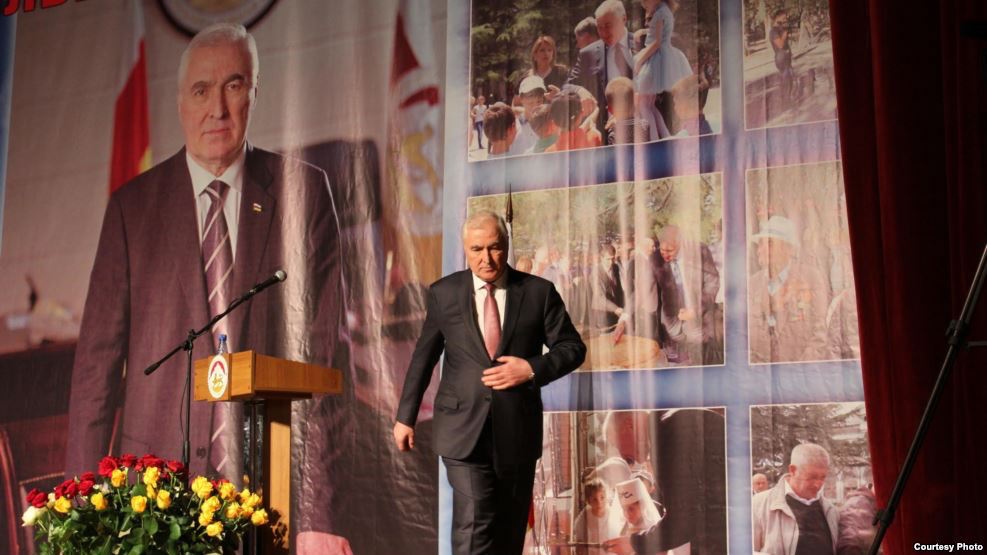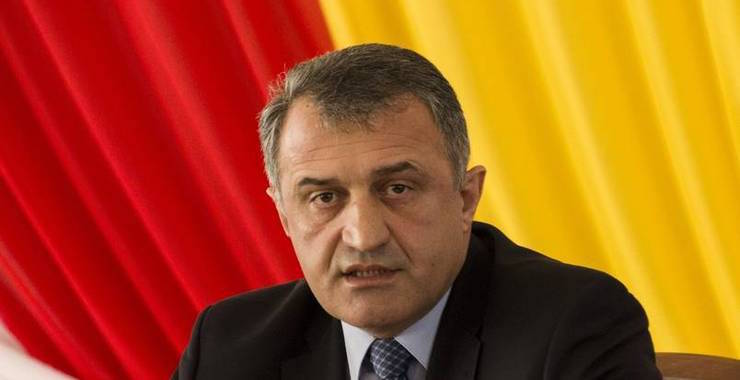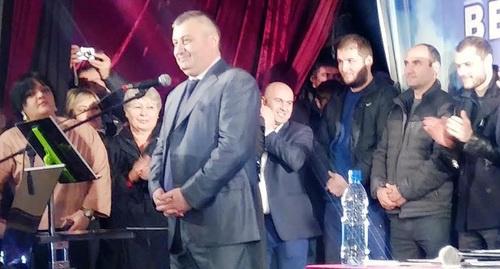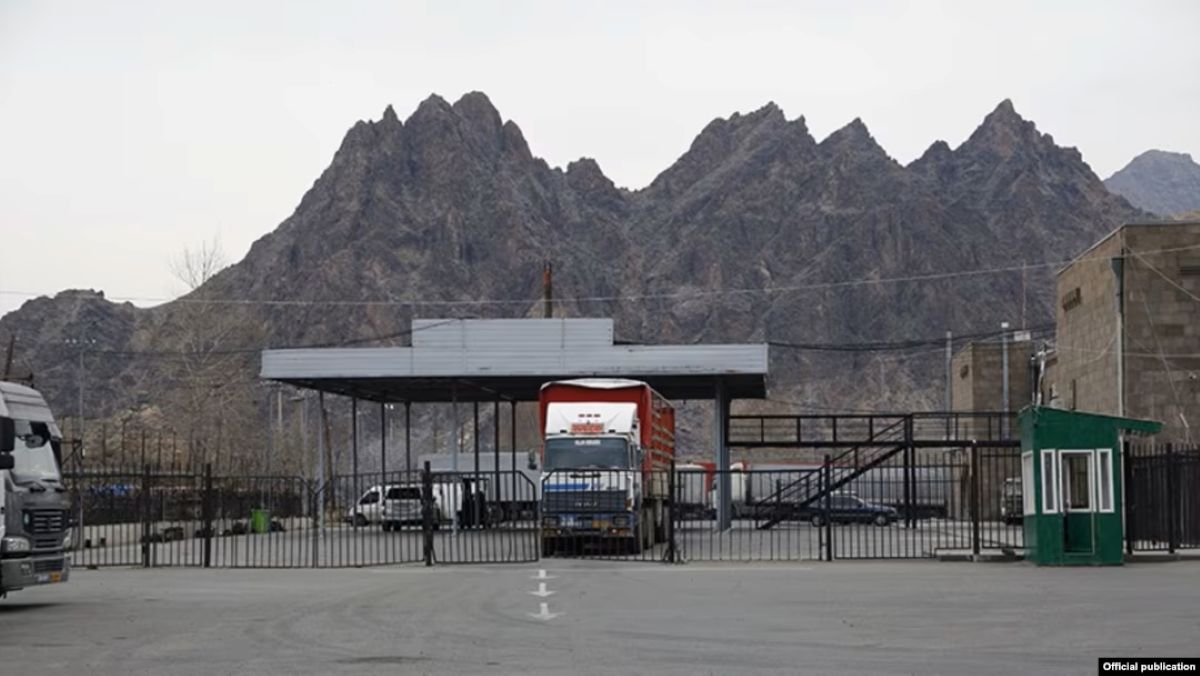Traitors and saviours: furious battle for presidency in South Ossetia
Scandals keep growing in number in the cause of the presidential campaign in South Ossetia. Confrontation between two leading candidates – the president and the parliament speaker – has turned into information wars, quarrels and public accusations.
The elections are due on April 9. The main competitors are president Leonid Tibilov and the parliament speaker and the United Ossetia party leader Anatoly Bibilov. Former president Eduard Kokoyty (2006 – 2011), who left the country after the political crisis, also intends to run. But local politicians consider him illegible because of the residence qualification

Leonid Tibilov

Anatoly Bibilov

Eduard Kokoyty
Tibilov and Bibilov: what they disagree about
Fierce competition between the two started long before 2017. In fact the politicians have been rivals since 2014. Anatoly Bibilov and his United Ossetia won the parliamentary elections in June 2014 under the slogan of making Ossetia part of Russia. Promising to boost integration he consolidated the parliamentary majority of 20 out of 34 and was elected the speaker.
President Tibilov also stands for joining North Ossetia and Russia. He told the press, that he “will consider his mission completed once it happens”.
The two argue about the methods and leadership.
Bibilov immediately refused to be controlled by the president and – unlike his predecessors – to coordinate parliament activities with the executive branch.
Though Anatoly Bibilov claims he is not in opposition to the president, the latter considers him a rival.
The relations worsened dramatically in January 2014 after the United Ossetia proposed a referendum on joining Russia.
The president and his team strongly opposed the initiative reminding, that foreign policy is the president`s exclusive competence. Tibilov replied, that the the Ossetian people dream of reunification cannot be monopolized by one party and its leader.
The referendum was banned amid strong criticism.
After Bibilov`s victory et the parliamentary elections the president began to comment on the reunification plan more actively, promising to organize a referendum on the matter in August 2016, taking the initiative away from his opponent. At the time Tibilov also proposed to change the constitution, so that the president could appeal to the Russian president on his own initiative. But the proposal was not accepted.
Ramifications of the rivalry
The rift between the president and the speaker led to worse relations between the executive branch and the lawmakers.
Professional parliament
In particular in 2016 the presidential law on professional parliament was blocked.
The law was blocked by the three opposition parties making for the parliamentary minority – People`s Party, National Unity and Nyhas.
2017 budget
At the end of 2016 a scandal erupted because of the 2017 budget. The speaker called the proposed 11 mln rubles allocation to the High Arbitration Court, that had been abandoned in 2014, a violation of the constitution. The parliamentary majority voted against the budget, the president and the speaker trading numerous accusations.
TV programs
In January 2017 the parliamentary minority complained of the “unfair time distribution” in the “Parliament Bulletin” TV program. They accused the speaker supporters of monopoly and proposed to distribute time between the four parliamentary parties equally.
The speaker disagreed and filed a complaint to the Prosecutor General`s office, accusing the executive branch of pressure on the parliament and the United Ossetia.
As a result the State Information and Media Committee issued a ban on “Parliament Bulletin”.
Anatoly Bibilov in response made a statement on the attempt “to discredit the speaker and the parliamentary majority”, calling upon the citizens “not to believe the lies, distributed by the opponents of the parliament”.
“These unlawful actions are unacceptable, – it said. – “Parliament Bulletin” intended to oppose the fierce disinformation campaign, initiated because of the budget voting. We wanted to make it clear, that the rejection of the budget will not affect state employees wages and the guaranteed budget articles, including the elections expenditures”.
In it`s next move the presidential office issued a ban on the “Details” program, also covering the work of the parliament.
Clashes in social media
The confrontation between the speaker and the president has spread into the social media as well. There are no independant media in South Ossetia. Under strict government censorship social media provide the only possibility for free expression. That is where the most strong accusations were traded, threatening to turn into a war of leaks.
On January 31 president Tibilov came out with public criticism of those users who “aim to interpret the authorities achievements in a false way”. The president even threatened to instruct prosecutors and special services “to investigate cases of unfair criticism in social media”.
“If you care about your country – come out with your proposals, that we can accept. Otherwise it is an act of betrayal” – he said.
Next day Yelena Kulumbegova, the United Ossetia activist, was dismissed from the Civil Defense Ministry following her critical remarks on Leonid Tibilov on her FB page.

The remarks have been removed. Kulumbegova claims, that one of them was a discussion of the incident involving Tibilov and Valery Khubulov, the first defense minister in independent South Ossetia. The latter claimed having once beaten Tibilov because of political disagreements.
“I wrote the following: “Ha-ha, seems he was beaten often. Hope, we will find the way out of the abyss”. Another post was in the “South Ossetia” group: “Turned on the radio on the way home. Propaganda is in full blossom. The old man does not want to leave obviously”. The president`s staff found lieutenant Kulumbegova~s remarks insulting and filed a complaint.
The battle of the statements
The official statements continued the confrontation.
On February 2 Anatoly Bibilov issued a statement in support of Kulumbegova.
“Authorities have turned from censorship to repressions trying to keep their power intact… it is a shame for the country… Let the people of South Ossetia and our brothers in the Russian Federation know of the lawlessness in the republic, usurped by the corrupt officials”, the statement said.
Alan, an Ossetian social media user shared his opinion with JAMnews:
“Freedom of expression is guaranteed by constitution of South Ossetia. We are free to seek and distribute information in any legal way. Fight against social media is a direct threat to this freedom and our personal safety. The KGB roots have made themselves obvious, and the president is openly threatening with KGB and prosecutors. Does he want the times back? When people were prosecuted for political jokes? These are Stalinist mthods, used by the KGB veterans”.
Three FB groups have been created to support acting president Tibilov, speaker Bibilov and former president Kokoyty.



















